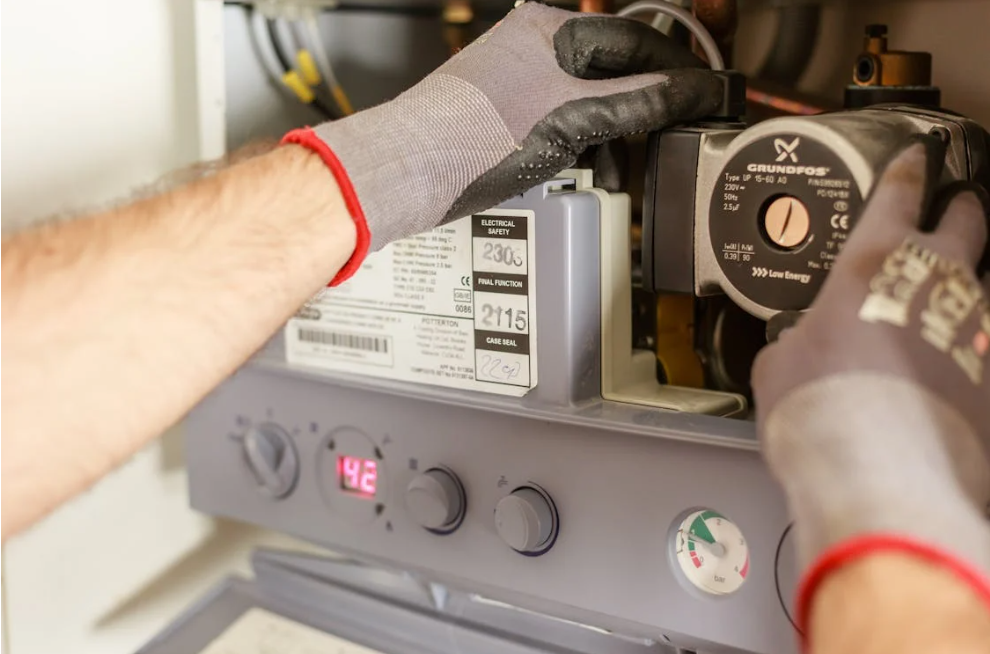Is It Time to Replace Your Gas Boiler?
An efficient and reliable gas boiler is essential for London homes, especially during the colder months when heating and hot water are critical. Over time, however, boilers can lose efficiency or become prone to issues, leaving homeowners with rising energy bills, frequent breakdowns, and the challenge of meeting new energy regulations. Recognizing the signs of an aging boiler—such as unusual noises, uneven heating, or a spike in repair costs—can help you decide when it’s time for an upgrade.
This guide explores key factors that indicate it might be time to replace your boiler, including how to assess its age, performance, and compliance with modern energy efficiency standards. By replacing an outdated system, you can enjoy improved safety, lower energy costs, and a more sustainable home. Read on to discover how upgrading your boiler can transform your home’s comfort and efficiency while ensuring long-term peace of mind.
Check Your Boiler’s Age
The age of your boiler plays a pivotal role in determining its efficiency, reliability, and cost-effectiveness. Most boilers have a typical lifespan of 10 to 15 years, after which their performance often begins to decline.
As components wear out, older systems can struggle to maintain optimal heating and hot water supply, leading to frequent breakdowns and costly repairs. For expert advice and seamless upgrades, consulting a professional like London plumber Staunch & Flow ensures your boiler is replaced or serviced to meet modern energy efficiency standards. Moreover, older boilers tend to lack modern features designed to maximize energy efficiency and reduce emissions.
Outdated boilers are usually less efficient than their modern counterparts, meaning they consume more energy to produce the same amount of heat. This inefficiency can result in noticeably higher energy bills, particularly as energy prices continue to rise. Additionally, older systems contribute more to carbon emissions, making them a less sustainable option for today’s environmentally conscious homeowners.
Replacing an aging boiler with a newer model is a smart investment that pays off in multiple ways. Modern boilers are equipped with advanced technology, including better insulation, improved heat exchangers, and compatibility with smart thermostats, all of which help to reduce energy consumption. These upgrades not only lower monthly bills but also align with London’s push for greener, more energy-efficient homes.
If your boiler is nearing or surpassing the 10-15 year mark, it’s worth considering an upgrade before issues escalate.
Look Out for Rising Energy Bills
Rising energy bills can be a strong indicator that your boiler is no longer operating efficiently. Inefficient boilers consume more energy to produce the same amount of heat, leading to unnecessarily high utility costs. This inefficiency is often due to outdated technology, worn components, or an inability to meet the demands of modern households.
Homeowners should regularly review their energy bills and compare them over time. If you notice a consistent upward trend in costs, despite maintaining similar usage patterns, your boiler might be the culprit. Older boilers typically have lower efficiency ratings, often hovering around 60-70%, compared to modern models that can achieve up to 90% or higher. This gap in performance directly impacts how much energy is wasted during operation, costing you more money in the long run.
Upgrading to a new, energy-efficient boiler can drastically reduce monthly expenses. Modern boilers, especially those rated A for efficiency, use advanced technology to optimize fuel consumption and minimize waste. Some models even feature smart controls, allowing you to schedule heating and monitor energy usage, ensuring further savings.
Beyond financial benefits, an efficient boiler contributes to a greener home by reducing carbon emissions. London’s push for sustainability means that making such upgrades can align your household with broader environmental goals.
Frequent Breakdowns and Repairs
Frequent boiler breakdowns are a clear warning sign that your system may be nearing the end of its useful life. While occasional maintenance and repairs are a normal part of owning a boiler, persistent issues requiring repeated professional intervention are often indicative of deeper problems. The costs of these repairs can quickly add up, sometimes rivaling or even exceeding the expense of replacing the boiler altogether.
As boilers age, their internal components become less reliable and more prone to failure. Issues such as leaks, loss of pressure, or faulty heat exchangers are not only inconvenient but can also compromise the efficiency of your system. These recurring problems are often a sign that the boiler is struggling to meet the demands of your home and may be working harder than it should, leading to increased wear and tear.
Investing in a replacement boiler can be a more economical choice in the long run. Modern boilers are built with durability and efficiency in mind, often coming with extended warranties and requiring less frequent maintenance. Upgrading also eliminates the uncertainty and stress of sudden breakdowns, ensuring a consistent and reliable supply of heat and hot water.
Uneven Heating or Hot Water Issues
Uneven heating or unreliable hot water supply are common signs of a struggling boiler. If certain rooms in your home are consistently colder than others or if your hot water runs out unexpectedly, your boiler may no longer be capable of meeting household demands. These issues are often caused by aging components, sediment buildup, or a system that is simply too small or outdated for your current needs.
Inconsistent heating typically points to problems such as failing valves, a malfunctioning thermostat, or blockages in the system that prevent heat from distributing evenly. Similarly, hot water issues may arise from problems like a failing heat exchanger or insufficient water pressure. These symptoms not only disrupt your comfort but also signal that your boiler is working harder than necessary, leading to increased energy consumption and wear.
Replacing your boiler can resolve these issues and ensure consistent comfort throughout your home. Modern boilers are designed with advanced features to maintain even heating and provide a steady hot water supply. They are also better equipped to handle the demands of larger households, offering improved performance and reliability.
Consider New Energy Efficiency Standards
The push for greener homes in London has led to stricter energy efficiency regulations and an increased emphasis on sustainability. As part of this initiative, homeowners are encouraged to replace outdated appliances, including boilers, with modern, energy-efficient models that help reduce carbon emissions and energy consumption. Upgrading to an A-rated boiler not only aligns with these goals but also provides numerous financial and environmental benefits.
A-rated boilers are designed to operate at over 90% efficiency, minimizing energy waste and lowering your utility bills. By replacing an older, less efficient system, you can significantly reduce your household’s carbon footprint while improving your home’s overall energy performance. This is particularly important as the UK continues to set ambitious targets for net-zero emissions, encouraging homeowners to take proactive steps toward sustainability.
In addition to environmental benefits, upgrading your boiler can make you eligible for government grants or incentive schemes aimed at promoting energy-efficient upgrades. Programs like the Boiler Upgrade Scheme or other local initiatives in London may help offset the initial cost of replacing your boiler, making the transition more affordable.
Adopting an energy-efficient boiler also future-proofs your home against evolving regulations and energy prices. As standards become increasingly stringent, upgrading now ensures compliance while enhancing the value and comfort of your property.
Check for Strange Noises or Smells
Unusual noises or smells coming from your boiler are warning signs that should never be ignored. Sounds such as banging, whistling, or gurgling often indicate internal problems. Common causes include airlocks, kettling (caused by limescale buildup on the heat exchanger), or failing components such as pumps or valves. These noises not only disrupt household peace but can also signal that the boiler is struggling to function efficiently, leading to potential system failure if left unaddressed.
Strange smells emanating from the boiler are an even more serious concern. A metallic or burning smell could indicate overheating or electrical issues, while a sulfur-like odor might suggest a gas leak. Combustion problems can also produce a faint smell of exhaust gases or carbon monoxide, which is colorless and odorless but deadly. Boilers are equipped with safety features, but malfunctions can compromise these systems, posing significant risks to your household.
If you notice unusual noises or smells, it’s crucial to act quickly. Regular servicing can sometimes resolve minor issues, but recurring problems often indicate that the boiler is beyond repair and needs to be replaced. Modern boilers are designed to operate quietly and safely, with features to prevent issues such as kettling or gas leaks.
Evaluate the Cost of Replacement vs. Repairs
When faced with frequent boiler issues, homeowners must weigh the cost of ongoing repairs against the one-time expense of a replacement. While occasional repairs are a normal part of maintaining a heating system, repeated breakdowns can quickly become a financial burden. As repair bills accumulate, the total cost often approaches—or even exceeds—the price of a new boiler, making replacement the more economical choice in the long run.
Modern boilers offer significant advantages that justify their initial investment. Many new models come with extended warranties, often ranging from 5 to 10 years, which cover parts and labor in the event of a malfunction. This eliminates the unpredictability of repair costs, providing financial peace of mind. Additionally, newer boilers are far more energy-efficient than older systems, with many achieving efficiency ratings of over 90%. This translates to reduced energy consumption and lower monthly utility bills, creating ongoing savings that can offset the replacement cost over time.
Moreover, the reliability of a new boiler minimizes disruptions to your household. Frequent repairs can be inconvenient and leave you without heating or hot water during critical periods, especially in winter. By replacing an unreliable boiler, you ensure consistent performance and avoid the stress of unexpected failures.
Consider Upgrading to a Smart Boiler System
Upgrading to a smart boiler system offers a host of benefits that go beyond just heating your home. Smart boilers are equipped with advanced controls and cutting-edge technology that enhance energy efficiency, convenience, and compatibility with modern smart home systems.
One of the standouts features of smart boilers is their ability to be remotely monitored and controlled through dedicated mobile apps. With these apps, you can adjust heating schedules, set temperature preferences, and even monitor energy usage—all from your smartphone or tablet. This level of control allows you to optimize your boiler’s performance and reduce energy waste by tailoring heating to your daily routines.
Smart boilers are also designed to learn and adapt to your household’s heating patterns over time. Some systems use artificial intelligence to predict when heating is needed, ensuring maximum comfort with minimal energy consumption. Additionally, many models integrate seamlessly with popular smart home devices, such as Amazon Alexa or Google Assistant, allowing for voice-activated control.
Energy efficiency is another key advantage. Smart boilers use advanced sensors to maintain precise temperature control, ensuring that no energy is wasted. This can result in significant cost savings on your monthly energy bills while reducing your home’s carbon footprint.
Consult a Professional for an Assessment
When considering boiler replacement, it’s crucial to consult a qualified plumber to assess the condition of your current system. A professional plumber will evaluate factors such as the age, efficiency, and reliability of the boiler. Based on this assessment, they can provide expert advice on whether it’s more cost-effective to repair the existing boiler or replace it with a new one.
Repairing a boiler can be an option if the issue is minor or related to specific components that can be fixed. However, for older boilers with frequent breakdowns or declining efficiency, replacement might be the more economical and sustainable choice. A plumber can help determine the best course of action by factoring in repair costs, the potential lifespan of the current system, and ongoing maintenance requirements.
Additionally, a qualified plumber ensures that a new system, if needed, is properly sized and installed for your home. The wrong boiler size can lead to inefficiency and higher energy costs. They can guide you through the process of selecting a system that meets your heating and hot water needs while offering improved energy efficiency.
Plan for the Best Time to Replace Your Boiler
Timing the replacement of your boiler is crucial to minimize disruptions and avoid unnecessary stress. The best time to replace a boiler is during the milder months, typically in late spring or early autumn. These periods are ideal as they fall outside the peak heating season, allowing you to replace your boiler without the pressure of needing immediate heat. Replacing your boiler during these months also means that you’re not relying on an old system during its final days when it could fail unexpectedly.
Planning ahead ensures that qualified engineers are available to carry out the installation. During the winter, plumbing companies are often busy with emergency repairs and may not be able to schedule routine installations as quickly. By scheduling your replacement in advance, you avoid the risk of long delays and get the attention of engineers when you need them most.
Replacing your boiler in advance also prevents emergency situations where a breakdown could leave you without heat or hot water in the middle of the coldest months. It gives you time to assess your options, compare different models, and ensure that the new system is energy-efficient and properly suited to your home’s needs.
Key Takeaways
Signs that it’s time to replace your gas boiler include inefficiency, frequent breakdowns, and rising repair costs. Upgrading to a modern, energy-efficient model can reduce heating bills, enhance performance, and provide long-term reliability. A new boiler also ensures peace of mind, as it’s less likely to fail unexpectedly. To ensure a smooth transition, consult a professional plumber to assess your current system and recommend the best solution based on your home’s needs. Replacing your boiler at the right time can prevent further issues and deliver significant cost savings over time.





We had to do this recently. It just wasn’t keeping up with our household needs and it was so frustrating! Definitely time to replace.
I rent my flat so thankful thats it is taken care of but these are some wonderful tips on looking out for if you need to replace a boiler
I live in a rented apartment, and my landlady will be responsible for replacing the boiler. However, this is excellent information to look out for to alert my landlady if I spot any signs.
It is a helpful article about gas boilers. We bought this house 5 years ago, and the previous owner was afraid of gas leaking and explosions. So he set the house on electricity.
It’s always important to be aware of the basics. Evaluating costs is important. Sometimes it can be more cost efficient and a better option to replace rather than to repair.
We don’t have a boiler here in my house in Texas, but we have natural gas heat. Although, to the point of replacing before it breaks, we did replace our AC unit recently when it started showing signs of acting up because summer in SE Texas is no joke!
Replacing a gas boiler can be a big decision. It’s helpful to have clear signs to look for so you know when it’s time.
I needed this article! We were about to replace our boiler, but your other options aer giving us pause. Thanks for the info, now we know when it’s time and what to look into.
I like the point you made about upgrading even if your old boiler is still working. Old, outdated models can use so much more energy, and they don’t heat as well or as evenly.
I like the point you made about upgrading even if your old boiler is still working. Old, outdated models can use so much more energy, and they don’t heat as well or as evenly.
This is such a practical and informative post! Your advice on when to replace a gas boiler is clear and super helpful for making a well-timed decision. 😊
This is a very informative post on whether to replace your gas boiler or not. Thanks for this information! Now I’ll know what to do.
This is all such useful information. I’ll be making sure to share this with everyone I know, especially those who own houses.
Thanks for the reminder to check my boiler, hot water heater, we built our home 24 years ago, and I don’t remember when we took at look at this. I’m sharing with my husband. Thanks !
I never thought about this, but it’s high time that I did! This was really useful information that’s definitely going to help me down the line; thank you for sharing!